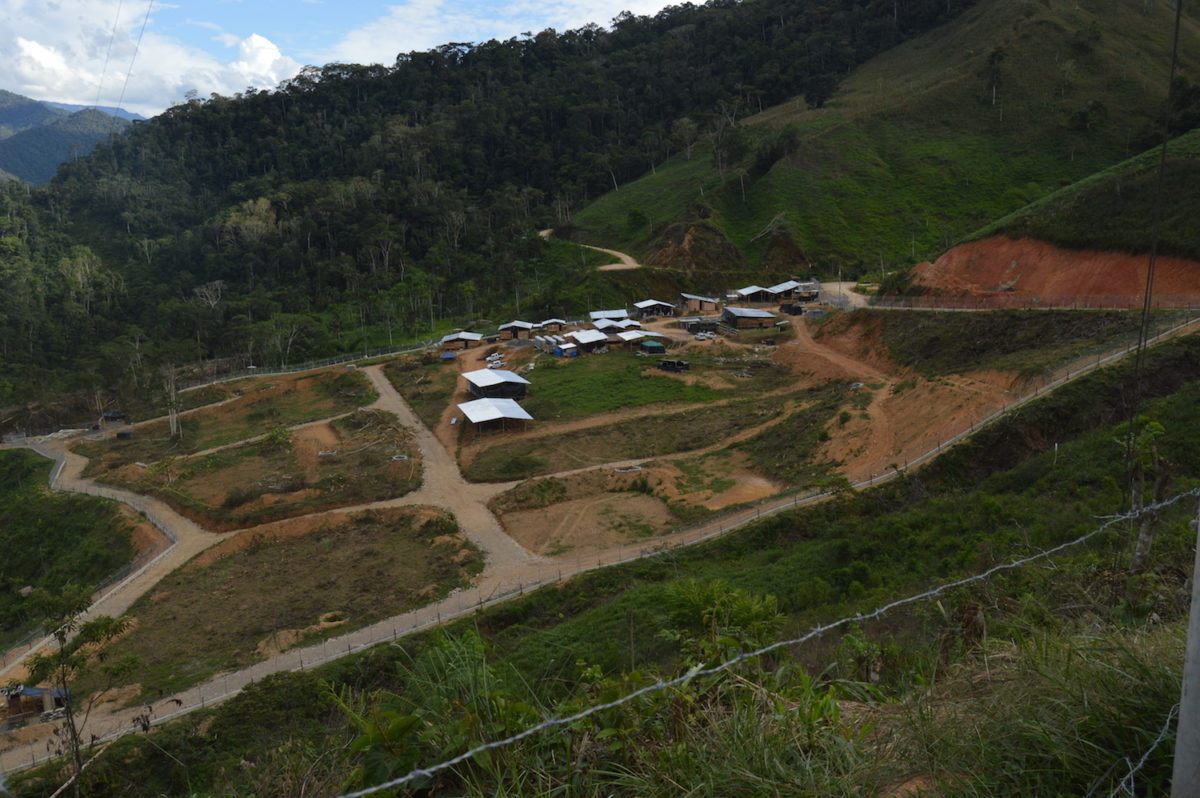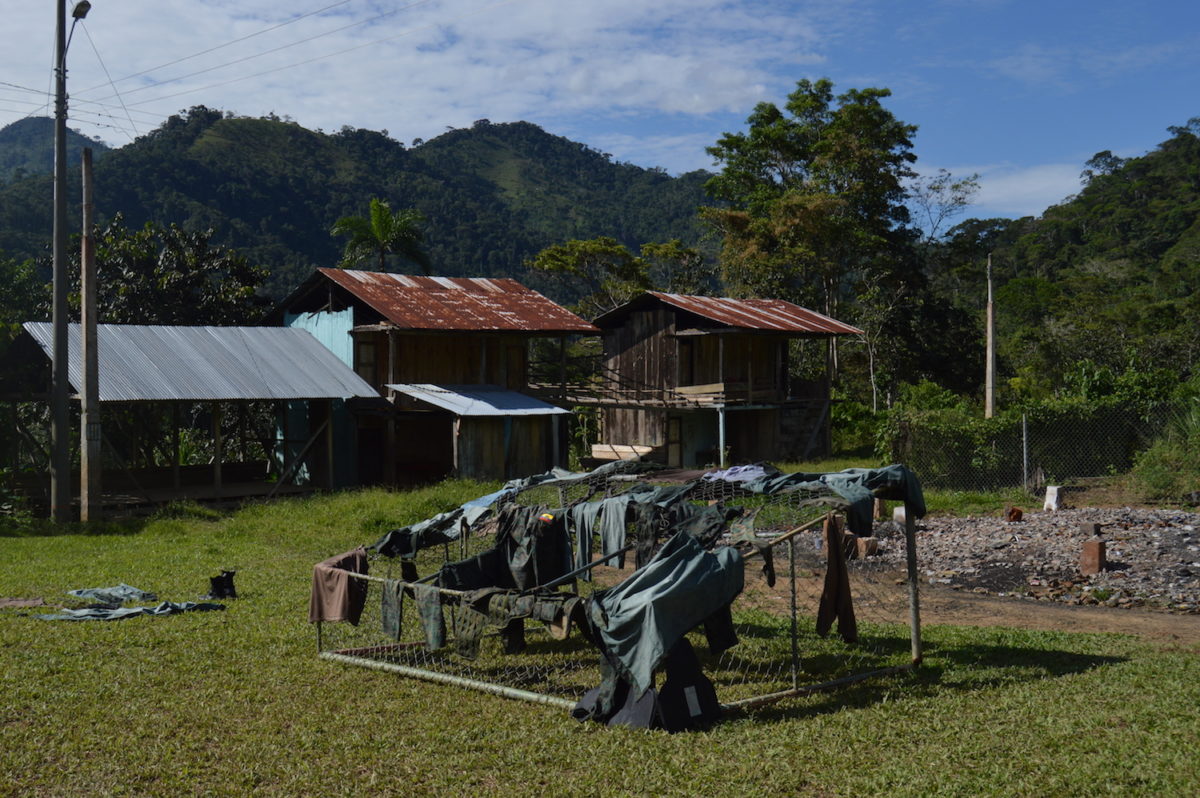- Questions abound over how the livelihoods of the Shuar community and the community landholders who live in a militarized space are faring
- Community demands from the Ecuadorian government are numerous
- Shuar people have said they feel besieged by the presence of the military
SAN CARLOS DE LIMON, Ecuador – To get to the community of San Carlos de Limón in Ecuador’s southeastern province of Morona Santiago requires traveling on a narrow, zigzagging dirt road for 90 minutes. The trip ends with a brief cable car ride over the Zamora River. En route one can contemplate the majesty of the Cordillera del Cóndor, a mountain range in the south of the Ecuadorian Amazon with an intact forest on the border with Peru.
This area will soon become a large open-pit copper mine. The site is part of the 41,760 hectares granted to the Chinese mining company Explorcobres S.A. (EXSA) for the development of the San Carlos-Panantza project. The project has been hampered by the opposition of Shuar communities in the area, who, supported by indigenous, regional and national organizations, claim the ancestry of the land.
Tension began last August when a massive police and military operation evicted eight families, a total of 32 people. The group formed the Shuar community of Nankints on land purchased by EXSA to establish their camp. Since then, a series of confrontations, raids and detentions have been unleashed, one police officer has died, and the area has been militarized. The area was declared as a “State of Exception” by the government in mid-December but they have failed to close the NGO Acción Ecológica, which was accused by the government of supporting violent actions.


The main structure of the small town center of San Carlos de Limón – a town near the community of Nankints taken by the Shuar indigenous people for a few days in December to try to stop the advance of the police force – is a multipurpose concrete court with a roof. Today, 50 soldiers have set up tents there to sleep in at night. Another approximately 50 police officers have remained in the area and have occupied some of the community houses and the health center.
Captain Garzón (who declined to give his first name), who is in charge of the soldiers temporarily in the area, local residents are at risk. According to Garzón, were it not for the military and police contingents sent by the government to prevent confrontations and mobilizations, San Carlos de Limón would look as desolate as the Shuar communities of Tsuntsuim and Kutukus, located several hours by foot.
Each day, a squad of 34 soldiers explores the perimeter for six hours, passing through the more remote communities to take note of the abandoned houses and schools. They also use drones and helicopters. The objective of the operations is to maintain order and keep a register of the settlers “so that there is no strange personnel around,” according to Garzón. He added that during the last weeks of January, under his watch the situation was completely calm. However, since the State of Exception was declared on December 14, the indigenous leadership warned about the displacement of several indigenous populations due to the presence of military and police forces.


In the first week of February, a group of Shuar women arrived in Ecuador’s capital city of Quito and gave a press conference explaining the conditions in which they left their homes. They were backed by the women’s leadership of The Confederation of Indigenous Nationalities of the Ecuadorian Amazon (Confeniae).
One of them was 18-year-old Claudia Chumpi from the Tsuntsuim community, who said that police and military squad had fired shots, raided their homes and broke their doors. With her infant in her arms, Chumpi said that women and children fled to the mountains. Two of her aunts who were pregnant gave birth in the mountains.
“I want to ask Rafael Correa to give us our territory back because it is our life, our land,” Chumpi said during the press conference, demanding that Ecuador’s president demilitarize the area. Chumpi added that after walking for days they arrived at the community of Tink where they are taking refuge for now – a place where they endure hardships daily hardships. Ruperto Tsanimp, the president in charge of the Inter-Provincial Federation of Shuar Centers (FISCH), reported that 80 people in that community are displaced.
A team of Mongabay reporters attempted to reach Tink but the conditions of the dirt road prevented access.

Chumpi said that residents of San Carlos de Limón stole their cookers and gas cylinders during the operation that displaced them. In contrast, the president of San Carlos, Franklin Domínguez, blamed a group of settlers and Shuar indigenous people from Chumpi’s community of causing outrage and attempting to extort some of their fellow locals. He did not give names.
Community landholders worried
To reach San Carlos de Limón, six police and military controls must be crossed, including one in the Santiago de Panantza parish, which can be accessed only by a secondary road. Although things in Panantza, a community inhabited by settlers who are mostly opposed to the mining operation, appear to be calm now, there were disruptions in the area recently. A few weeks ago the police raided several houses in the town and arrested and jailed four members of the parish committee.
The local prosecutor’s office tried to incriminate the parish members for the death of police officer José Mejía in an alleged confrontation in the Esperanza mining camp, established on the land that was once of the Nankints community, according to statements from the prosecution and the Ministry of the Interior.
Afterward, in mid-December, President Correa said that Mejía was shot in the head during the ambush of a military truck by a Shuar group.
In the absence of evidence, the Provincial Court of Morona Santiago released the community landholders on January 13.
“They treated him worse than a criminal, and they pushed him inside the car,” said Julio Reinoso, father of one of the detainees. “These people have no soul.” Reinoso spoke not only of the unpleasant experience his family had to go through due to the unjust detention of his son, but also to the growing concern of the copper exploitation that will develop in the area.
“When the mining starts, we will have to leave; nothing will be left […] There are springs of water everywhere, and they will all be contaminated.” He added that he fears that Santiago de Panantza will disappear since the mineral reserve is just below the town center. “We have nowhere to go.”
Reinoso’s son, Milton Reinoso, is vice president of the Parish Board of Panantza and was detained for a month. He shares his father’s concern. He explained that the information they have about the mining project is minimal and although most of the inhabitants are against large-scale mining, they are not well-organized enough to oppose it. Father and son also agreed when talking about the peaceful coexistence they have had for years with the Shuar communities that inhabit the area.
They also dispute reports of violence from the Shuar side. In interviews with Mongabay they both said that in recent months they knew of no Shuar armed group causing riots, as has been broadcast by the national government on radio and television.

Milton Reinoso also spoke about his arrest and alleged police mistreatment during his transfer to the maximum security prison in Latacunga, Cotopaxi province. According to him, on the day that the clashes took place, took the life of the police and caused the declaration of State of Exception, he was not in town.
“As a precaution, I took my children to San Juan Bosco, with my father and wife…people were afraid that there would be a stray bullet,” he said. However, a few days later the police burst into his home and took him in handcuffs. “They took everybody from the parish board that they managed to find.”
He said they handcuffed everybody’s hands behind their backs and locked them in a kind of windowless steel box located in the hopper of a van.
“The worst thing was the transfer from Macas (provincial capital) to Latacunga in a car where they take the most terrible criminals.” With nothing to hold onto, they made a 270 kilometer (167 miles) journey at full speed along a bumpy, winding road. “They never stopped when passing through the speed bumps. We all bumped from side to side. We hit our heads; we bled from the nose and also vomited.”
Reinoso added that the policemen who transported them pressured them to confess their participation in the death of the police officer. The version is corroborated by John Marín, brother of the president of the Parish Board who was also arrested, 29-year-old Danny Marín. He said that the whole family suffered during the arrest, especially his pregnant sister-in-law.
The concern of the community landholders of Santiago de Panantza is shared by the inhabitants of San Carlos de Limón. To reach San Carlos de Limón you have to cross the collapsed community of Nankints, now converted into the La Esperanza camp of the EXSA mining company. It is a fenced perimeter surrounded by threads of barbed wire with several surveillance points, elevated and sheltered by sandbags. Several policemen wearing helmets and armed with rifles inspect every vehicle and its occupants.
One of the concerned landholders is Oswaldo Domínguez, uncle of the president of the community. Domínguez said in an interview that he was a supporter of mining in the area for years because he mistakenly thought that it would bring improvements in health and education and work opportunities.
“Unfortunately the mining company used me,” Domínguez said. “They never gave us any information and never helped us with projects with innovative visions of the future. They only gave us chickens.” Domínguez added that there was a lack of communication about the San Carlos-Panantza mining project.
“They have not said where the tailing pit [dumping area] is, where they are going to put the tailings or the dimensions of the cut,” he said. He said he is also worried about the precedent set in Tundayme, a village in the neighboring province where the subsidiary of EXSA, EcuaCorriente, executed several mining easements that led to the eviction of the community of San Marcos.
“My main concern is, fifteen years from now, where are they going to relocate us?” Domínguez asked.
Banner photo by Lalo Calle
This story was reported by Mongabay’s Latin America (Latam) team and was first published in Spanish on our Latam site on February 2, 2017.







